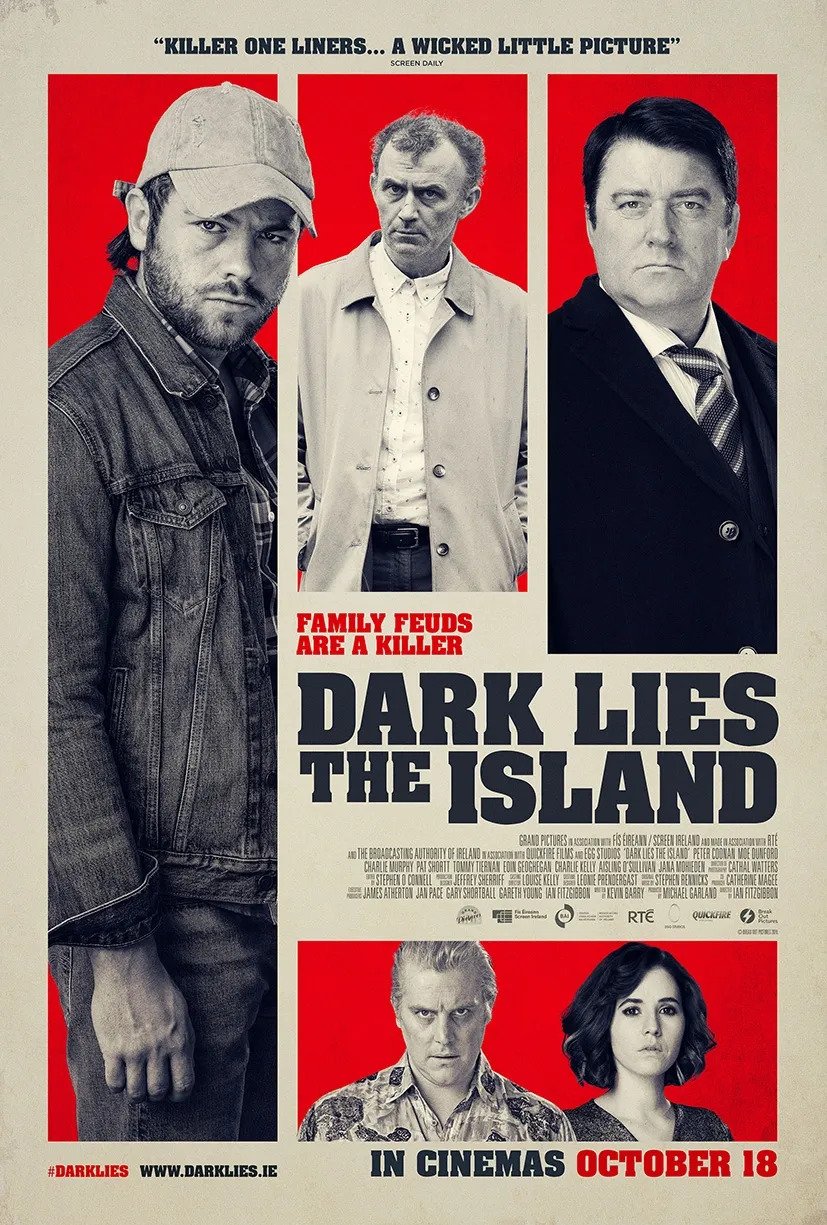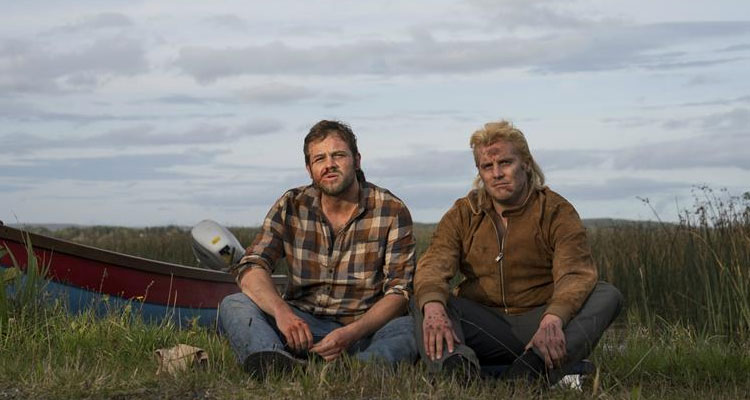Opening in Irish cinemas on October 18th, DARK LIES THE ISLAND is a story about life and death, sex and violence, dark memories, murderous intentions, jealousy, guilt, and betrayal – it’s a story, in other words, about an Irish family. We caught up with director Ian Fitzgibbon to chat about the making of the movie.
|
Were you familiar with Kevin Barry’s work before the idea of the final came about?
Tommy Tiernan gave me a collection of Kevin’s short stories. He said that it felt different and recommended that I read them. I remember reading them and being struck by them. They presented something familiar to me, an Ireland that I kind of knew but presented in a different way. It was like looking at the flip side of a familiar postcard. It was seeing something you’ve seen many times before, but Kevin’s writing shows you a new way of seeing it or lets you see what is behind the picture. I found that really exciting. There is a huge amount of short story writers in Ireland who write about country life and small town life, but these felt incredible, contemporary and relevant. They didn’t feel lodged in the past.
What was it about his writing that drew you in?
What drew me to it was finding comedy in very dark moments. I was drawn to that dark comedy tone. There is a lot of that in Kevin’s [Barry] writing, he has a very unique vision of things. He has a very distinctive voice and a great eye for the tragic-comic.
How did the film come about?
I was in the UK directing a lot of television. I wanted to do a more personal project and I was looking for ideas. When Tommy gave me the stories, I rang Kevin and told him I wanted to make one of them, Breakfast Wine, into a short story. I made it and Pat Shortt was in it and it had some success. It won a few prizes. It was useful for Kevin and I to get to know each other and our way of working. It was a happy collaboration and we both thought it would be fun to work on a bigger project, so that is where the idea for the feature came from.
The film is a hybrid of several of the stories, how did that process work?
They are inspired by the short stories. The film isn’t any one particular story, but when we were talking about it, I pointed out which ones I thought would make good film material so we narrowed our scope until we came up with the film.
The film has some of the best actors working in Ireland today. How did you net them all?
It was fantastic to get them all! Tommy [Tiernan] is a friend of mine and we often talked about doing something together, but we never had the opportunity. I approached him early on and he was very keen to be a part of it. He was drawn to that type of writing. After I made the short with Pat [Shortt] we both wanted to work on something more ambitious together, so he came on board straight away. When it came to casting the younger actors, I had been working so much abroad that I was a little out of the loop about what was going on in Ireland, so it was really exciting to discover this really great younger generation of actors like Moe Dunford. I wasn’t familiar with him and, of course, everyone here is because he has done so much good work. It was great to get him and to get Peter Coonan, Charlie Murphy, and the others. It was also great to have Aisling O’Sullivan; she is such a strong actor. She was in my first film and she is just brilliant. There is a lot of serious Irish talent at the moment and it was really exciting to get to work with them.
Tommy Tiernan’s character, Ritchie, has a lot of secrets and not many of them are revealed. Why did you decide to keep the audience guessing about him?
I think Kevin and I were very drawn to the idea of not explaining things too much. I see him as an angel who has been dropped in the town. He is an otherworldly figure who has an important role in the story. We were drawn to his mystery, we wanted to keep it that way. We knew some audience members would be frustrated by not knowing more, but other people would enjoy it.
Ritchie is the type of character who could reoccur if you were to make more films based on Barry’s work. Any plans to do something like that?
I can totally see where you are coming from, that would be fun, but no plans at the moment! I am very curious about Tommy as an actor. I enjoyed working with him and I especially enjoyed working with him on something that explores a different side of his acting ability. It’s something much darker, and serious, and more psychologically complex than we are used to seeing from him and he did it brilliantly. I am really curious to see what else he has in the tank.
The film looks beautiful. Did you collaborate with your cinematographer, Cathal Watters, or did you outline your vision and give him free rein to come up with a concept?
Things like that can depend but, for this, I looked at a lot of photographs and paintings. David Lynch came to mind, but I didn’t look too much at film because I didn’t want to be overly influenced. I wanted colour. It is such a dark, twisted world that I didn’t want naturalism. I wanted to direct it with the emotional side of my brain. I feel like it’s almost an opera. It’s lush and full-on, and the emotions of the characters are eventually given full range and that’s something I really enjoyed. I gave Cathal, the director of photography my references and told him what interested me. I told him I didn’t want any grey, or grime, or dark saturation. I wanted places that had all of that but came to the screen vividly. I likened it to looking at the postcards I talked about early on and then dropping some acid on them and then looking at them through bleary-eyed hangover lens. The lake was also very central to the theme. I wanted water, rain, and wetness to play a part. I almost wanted the audience to be looking at the world under the lake, not just the reflection of it, as one of the characters in the film says. I am so pleased with how it turned out, at how the boldness of colour is used. I am very proud of it.
You mentioned that you have been working abroad for some time. Do you think this film might be the start of more homegrown work?
I would love it. There is something about shooting in Ireland that filled me with joy. It’s an extraordinary country and I don’t mean that in a rose-tinted glasses way. The variety of landscape that we can film is fantastic. The film crews we have are so talented and efficient. I’ve worked in North America where the crews are much bigger, but everything takes much longer. Here things are flexible but work at speed. We shot the film in just 18 days. It’s a real credit to the crew. Roscommon was great to film in. It is so flat and marshy and distinct looking. I shot some of Moone Boy in Boyle so I was familiar with the county, but this was a different side to it. It has such a dramatic and compelling landscape; it looks great on film.
There is a lot in this film relating to mental health. Is there something in that that you want audiences to take away?
After I made the film, I became aware that we are all potentially walking a fine line. What distinguishes someone with mental health issues and someone without them is so slim. It can be a set of circumstances, something navigated that leads to anguish, anxiety, or depression. I struggled with these things, I’m sure most people have. I think there is an epidemic out there. People are struggling and plenty of it is hidden. Peter Coonan’s character has problems with addiction and more than just that, and makes me think – there but for the grace go I. Kevin understands so wisely that many people keep these things in their head, but some people just can’t contain it. There are those who suffer, but still go to work, have families, and keep going. Others simply can’t. The film played at a festival in Dingle and I met someone who has a family member with mental health issues, and she said it was great to see people depicted on screen who have similar issues. I hope this resonates with people and the stigma lessens. I wanted people to develop an understanding by watching these characters.
DARK LIES THE ISLAND is at Irish cinemas from Oct 18th




